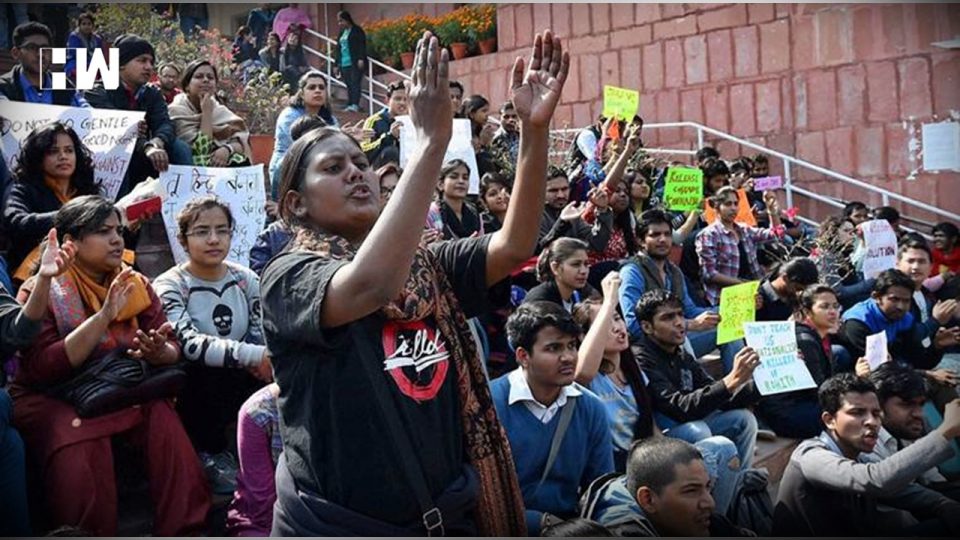With the first phase of Lok Sabha elections just a week away, the students’ unions at various universities have been working hard to boost the poll prospects of their parent parties.
New Delhi| Reaching out to the grassroots level, arranging visits, campaigning for candidates and connecting with young voters are few of the responsibilities political parties have allocated to their students’ union leaders ahead of the Lok Sabha polls.
While students’ union elections have long been viewed as a stepping stone to mainstream electoral politics, political parties see them as an efficient way of connecting with the youth and forming a base.
With the first phase of Lok Sabha elections just a week away, the students’ unions at various universities have been working hard to boost the poll prospects of their parent parties.
Delhi University Students’ Union president Shakti Singh, a member of the BJP’s Akhil Bharatiya Vidyarthi Parishad, said, “Before the polls were announced, we held a voter awareness campaign in DU colleges and some residential areas nearby where we told people that they should support the right-wing in the interest of nationalism.”
“Plans are still being worked out and we will do as instructed. Former DUSU president Nupur Sharma was part of the core team that had ensured the BJP’s win in the 2014 elections,” he added.
Student leaders in Jawaharlal Nehru University (JNU), which is one of the most politically charged varsities in the country, are planning to go to different states to campaign for the candidates of their respective political parties.
JNU Students’ Union (JNUSU) joint secretary Amutha Jayadeep said she, along with others, will tell students at different universities that policies of both the BJP and the Congress are aimed at denying access to education and making it more exclusive.
“In its manifesto, the CPI has promised allocation of six per cent of GDP to education. We will be going to various constituencies from where Left candidates are contesting and tell people about it and how education is under threat,” she said.
“The plans are still being finalised. But some of us will be heading to Begusarai, Bihar, to campaign for former JNUSU president Kanhaiya Kumar, and some to Kerala,” she added.
Students’ groups at varsities like Banaras Hindu University, Jamia Millia Islamia and Jadavpur University, where the struggle is on for restoring students’ union elections, are also campaigning for the political parties they are associated with and persuading people to vote for them.
Some students’ unions are also working to encourage voters to make informed choices.
President of Rajasthan University Students’ Union (RUSU), Vinod Jhakhar, said, “I am not affiliated to any party but the upcoming Lok Sabha elections are very important for the country. I, along with other students and my supporters, will be starting a door-to-door campaign from April 1, wherein we will be encouraging everybody to vote and make their choice wisely.”
Jhakar, a former member of the Congress’s National Students’ Union of India, had contested the RUSU elections, held last year, as an independent.
Maskoor Ahmad Usmani, president of Aligarh Muslim University Students’ Union, said the group was conducting public meetings to encourage the students and their parents to question the MPs in their respective constituencies and to evaluate their performance.
“We are trying to make them understand that we do not choose the PM, we choose the MPs here, so the first step gone wrong can make the entire process futile. We do not have a representation of any political party here,” he said.
Union Finance Minister Arun Jaitley, senior Congress leader Ajay Maken, BJP’s Satish Upadhyay and Vijay Goel and AAP’s Alka Lamba are some of the national and state level politicians who began their careers as student leaders.
The Lok Sabha elections will be conducted in seven phases from April 11 to May 19. Voting for 543 seats will be held at nearly 10 lakh polling booths across the country.
The results will be announced on May 23.
As an independent media platform, we do not take advertisements from governments and corporate houses. It is you, our readers, who have supported us on our journey to do honest and unbiased journalism. Please contribute, so that we can continue to do the same in future.

